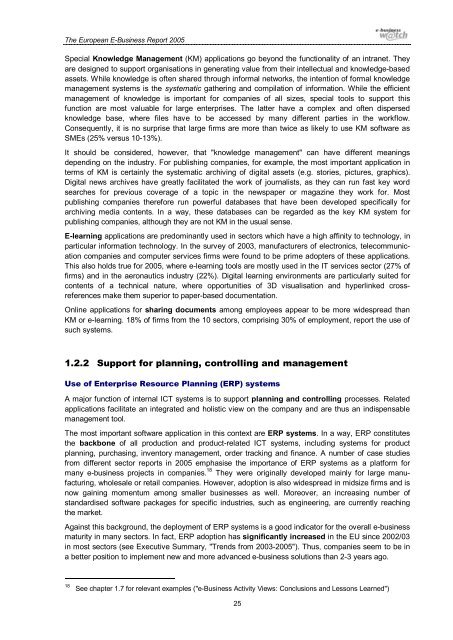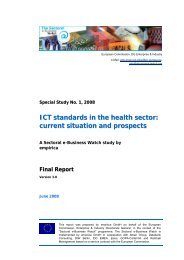The European e-Business Report The European e ... - empirica
The European e-Business Report The European e ... - empirica
The European e-Business Report The European e ... - empirica
Create successful ePaper yourself
Turn your PDF publications into a flip-book with our unique Google optimized e-Paper software.
<strong>The</strong> <strong>European</strong> E-<strong>Business</strong> <strong>Report</strong> 2005<br />
Special Knowledge Management (KM) applications go beyond the functionality of an intranet. <strong>The</strong>y<br />
are designed to support organisations in generating value from their intellectual and knowledge-based<br />
assets. While knowledge is often shared through informal networks, the intention of formal knowledge<br />
management systems is the systematic gathering and compilation of information. While the efficient<br />
management of knowledge is important for companies of all sizes, special tools to support this<br />
function are most valuable for large enterprises. <strong>The</strong> latter have a complex and often dispersed<br />
knowledge base, where files have to be accessed by many different parties in the workflow.<br />
Consequently, it is no surprise that large firms are more than twice as likely to use KM software as<br />
SMEs (25% versus 10-13%).<br />
It should be considered, however, that "knowledge management" can have different meanings<br />
depending on the industry. For publishing companies, for example, the most important application in<br />
terms of KM is certainly the systematic archiving of digital assets (e.g. stories, pictures, graphics).<br />
Digital news archives have greatly facilitated the work of journalists, as they can run fast key word<br />
searches for previous coverage of a topic in the newspaper or magazine they work for. Most<br />
publishing companies therefore run powerful databases that have been developed specifically for<br />
archiving media contents. In a way, these databases can be regarded as the key KM system for<br />
publishing companies, although they are not KM in the usual sense.<br />
E-learning applications are predominantly used in sectors which have a high affinity to technology, in<br />
particular information technology. In the survey of 2003, manufacturers of electronics, telecommunication<br />
companies and computer services firms were found to be prime adopters of these applications.<br />
This also holds true for 2005, where e-learning tools are mostly used in the IT services sector (27% of<br />
firms) and in the aeronautics industry (22%). Digital learning environments are particularly suited for<br />
contents of a technical nature, where opportunities of 3D visualisation and hyperlinked crossreferences<br />
make them superior to paper-based documentation.<br />
Online applications for sharing documents among employees appear to be more widespread than<br />
KM or e-learning. 18% of firms from the 10 sectors, comprising 30% of employment, report the use of<br />
such systems.<br />
1.2.2 Support for planning, controlling and management<br />
Use of Enterprise Resource Planning (ERP) systems<br />
A major function of internal ICT systems is to support planning and controlling processes. Related<br />
applications facilitate an integrated and holistic view on the company and are thus an indispensable<br />
management tool.<br />
<strong>The</strong> most important software application in this context are ERP systems. In a way, ERP constitutes<br />
the backbone of all production and product-related ICT systems, including systems for product<br />
planning, purchasing, inventory management, order tracking and finance. A number of case studies<br />
from different sector reports in 2005 emphasise the importance of ERP systems as a platform for<br />
many e-business projects in companies. 18 <strong>The</strong>y were originally developed mainly for large manufacturing,<br />
wholesale or retail companies. However, adoption is also widespread in midsize firms and is<br />
now gaining momentum among smaller businesses as well. Moreover, an increasing number of<br />
standardised software packages for specific industries, such as engineering, are currently reaching<br />
the market.<br />
Against this background, the deployment of ERP systems is a good indicator for the overall e-business<br />
maturity in many sectors. In fact, ERP adoption has significantly increased in the EU since 2002/03<br />
in most sectors (see Executive Summary, "Trends from 2003-2005"). Thus, companies seem to be in<br />
a better position to implement new and more advanced e-business solutions than 2-3 years ago.<br />
18<br />
See chapter 1.7 for relevant examples ("e-<strong>Business</strong> Activity Views: Conclusions and Lessons Learned")<br />
25

















